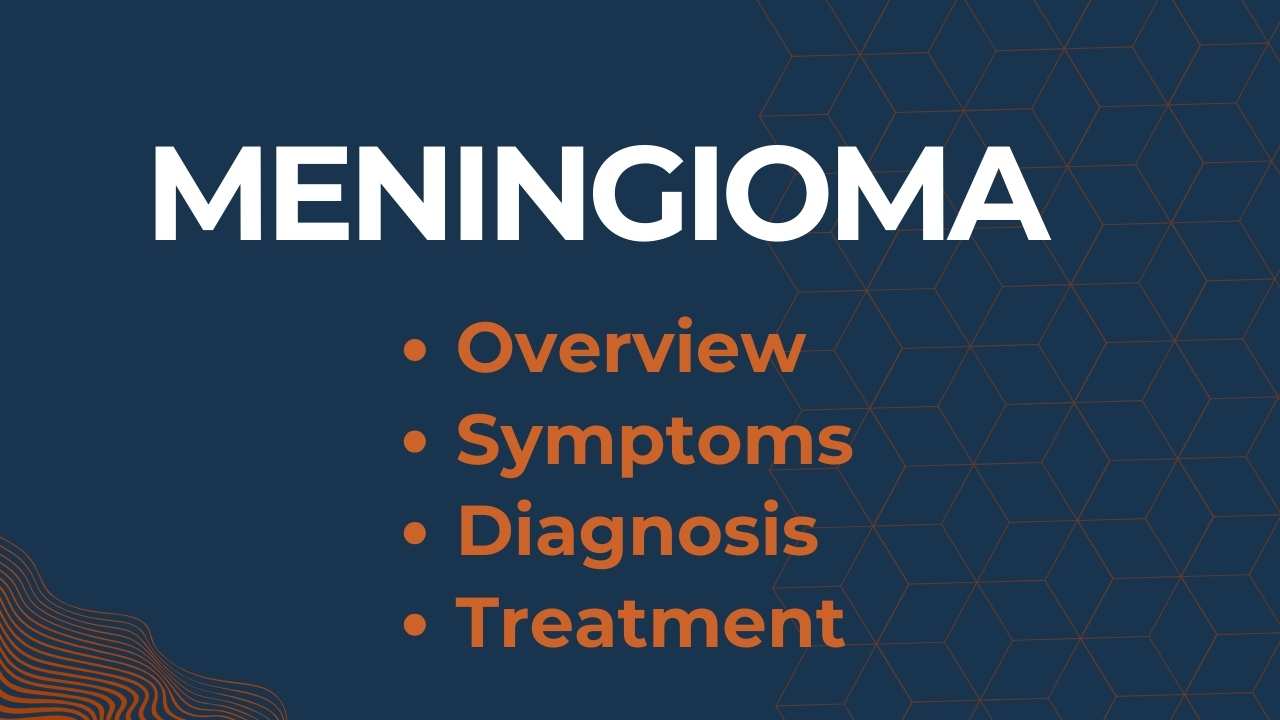Meningioma
Meningioma Symptoms, Treatment, Causes & Best Surgeon
Meningiomas are among the most common types of primary brain tumors, yet they are often misunderstood. Unlike other brain tumors that originate from brain cells themselves, meningiomas arise from the meninges – the protective membranes that surround the brain and spinal cord. While the vast majority of meningiomas are benign (non-cancerous) and slow-growing, their presence can still lead to significant health issues due to their location and the pressure they exert on delicate brain or spinal cord structures.
In Pune, India, Dr. Jaydev Panchwagh, a highly respected neurosurgeon, offers comprehensive care for patients diagnosed with meningiomas. With extensive experience and a commitment to utilizing the most advanced surgical techniques, Dr. Panchwagh ensures that each patient receives a precise diagnosis and an individualized treatment plan for optimal outcomes.

What is a Meningioma?
A meningioma is a Tumor that forms on the membranes (meninges) that enclose the brain and spinal cord. These membranes are made up of three layers: the dura mater, arachnoid mater, and pia mater. Meningiomas typically grow from the arachnoid layer.
They are generally slow-growing and often do not cause symptoms until they become large enough to press on the brain or spinal cord.
While most meningiomas are benign (Grade I), some can be atypical (Grade II) or, rarely, malignant (Grade III), growing more rapidly and having a higher chance of recurrence.
Dr. Jaydev Panchwagh emphasizes that even benign meningiomas require careful consideration and expert management, especially if they are located near critical areas of the brain or spinal cord.
- Symptoms
- Causes and Risk
- Diagnosis
- Treatment
Meningioma Symptoms
The symptoms of a meningioma depend heavily on its size, location, and rate of growth. Since many meningiomas grow very slowly, they might not produce noticeable symptoms until they are quite large. When symptoms do occur, they are typically due to the tumor pressing on nearby brain tissue or nerves. According to Dr. Jaydev Panchwagh and insights from neurosurgerypune.com, common symptoms include:
- Headaches: Persistent headaches that may worsen over time, often accompanied by nausea or vomiting.
- Seizures: New onset of seizures, especially in adults.
- Neurological Deficits:
- Weakness or numbness: Often on one side of the body.
- Vision problems: Blurred vision, double vision, or loss of peripheral vision.
- Hearing loss or Tinnitus: A ringing or buzzing sound in the ears, particularly if the tumor is near the ear.
- Changes in smell: Anosmia or altered sense of smell if the tumor is near the olfactory nerves.
- Speech difficulties: Trouble speaking or understanding language.
- Balance and coordination problems: Dizziness, unsteadiness, or difficulty walking.
- Cognitive and Behavioral Changes: Memory problems, personality shifts, or difficulty concentrating.
- Hormonal problems: If the tumor is located near the pituitary gland.
It’s crucial to consult a neurosurgeon if you experience any of these symptoms, as early detection can significantly improve treatment outcomes.
The exact cause of meningiomas is not fully understood, but certain factors are known to increase the risk:
- Genetics: A small percentage of meningiomas are linked to inherited genetic disorders, such as Neurofibromatosis type 2 (NF2).
- Radiation Exposure: Exposure to radiation, particularly to the head, can increase the risk of developing a meningioma years later.
- Hormonal Factors: Meningiomas are more common in women, suggesting a possible link to hormones, as they have hormone receptors (especially progesterone receptors).
Age: The risk of developing meningiomas increases with age, most commonly diagnosed in older adults.
Accurate diagnosis is fundamental for effective management of meningiomas. Dr. Jaydev Panchwagh employs a meticulous diagnostic approach, leveraging advanced imaging and, when necessary, pathological analysis:
- Neurological Examination: A comprehensive assessment of reflexes, vision, hearing, balance, coordination, and cognitive function to identify any deficits.
- Imaging Tests:
- MRI (Magnetic Resonance Imaging) with contrast: This is the primary diagnostic tool, providing detailed images of the brain and highlighting the tumor’s size, exact location, and relationship to surrounding structures. Dr. Panchwagh often uses advanced MRI techniques for detailed mapping.
- CT (Computed Tomography) scan: May be used to assess bone involvement by the tumor or if the tumor is calcified.
- Angiography: In cases where the meningioma has a rich blood supply or is close to major blood vessels, angiography can provide a detailed map of the vascular architecture, which is critical for surgical planning.
Biopsy: While imaging can strongly suggest a meningioma, a definitive diagnosis, including its grade (benign, atypical, or malignant), is made through a biopsy, where a tissue sample is surgically removed and examined under a microscope.
The treatment strategy for a meningioma is highly personalized, considering factors such as the tumor’s size, location, grade, the patient’s age, overall health, and the presence and severity of symptoms. Dr. Jaydev Panchwagh, with his extensive experience in treating brain tumors, offers a range of advanced options:
- Observation (Watchful Waiting):
- For small, asymptomatic meningiomas, especially in older patients or those with significant health issues, Dr. Panchwagh may recommend a “watch and wait” approach. This involves regular MRI scans to monitor the tumor’s growth. If the tumor grows or causes symptoms, treatment will be considered.
- Surgical Resection (Craniotomy):
- The Best Option for Cure: Surgical removal is often the primary and most effective treatment, especially for symptomatic or growing meningiomas. The goal is complete surgical resection while preserving neurological function.
- Dr. Panchwagh’s Advanced Techniques:
- Microsurgery: Utilizing high-power operating microscopes, Dr. Panchwagh performs highly precise tumor removal, minimizing damage to surrounding critical brain structures. This is particularly crucial for meningiomas attached to vital blood vessels or nerves.
- Neuro-navigation: This GPS-like technology provides real-time, 3D images of the brain and tumor during surgery, guiding the surgeon with unparalleled accuracy.
- Endoscopic Endonasal Surgery: For select meningiomas located at the skull base, this minimally invasive technique allows access to the tumor through the nasal cavity, avoiding traditional open surgery.
- Skull Base Surgery: Dr. Panchwagh specializes in complex skull base meningiomas, employing advanced techniques to safely remove tumors in these challenging anatomical regions.
- Cavitron Ultrasonic Aspirator (CUSA)
- Benefits: Complete surgical removal often leads to a cure for benign meningiomas, with a potential for a normal life span.
- Radiation Therapy:
- Radiation therapy uses high-energy beams to destroy tumor cells or halt their growth. It may be used in several scenarios:
- After incomplete surgical removal: To treat residual tumor and prevent recurrence.
- As a primary treatment: For tumors that are inoperable due to their location or for patients who are not candidates for surgery.
- For atypical (Grade II) or malignant (Grade III) meningiomas: Often used post-surgery to reduce the risk of recurrence.
- Types of Radiation Therapy:
- Stereotactic Radiosurgery (SRS): A highly focused, single-session radiation treatment for smaller tumors, delivering a high dose of radiation with extreme precision. (Gamma Knife Radiation)
- Fractionated Stereotactic Radiotherapy (SRT): Delivers radiation in multiple smaller doses over several weeks, often used for larger tumors or those near sensitive structures like the optic nerve.
- Intensity-Modulated Radiation Therapy (IMRT) and Proton Beam Therapy: Advanced techniques that conform radiation dose to the tumor’s shape, sparing surrounding healthy tissue.
- Radiation therapy uses high-energy beams to destroy tumor cells or halt their growth. It may be used in several scenarios:
- Chemotherapy and Targeted Therapy:
- Chemotherapy is rarely effective for most meningiomas and is generally considered only for aggressive or recurrent malignant meningiomas that have not responded to surgery or radiation.
- Research into targeted therapies that specifically attack cancer cells is ongoing.
Watch this Video to Know More about Meningioma
Why Choose Dr. Jaydev Panchwagh for Meningioma Treatment?
For individuals diagnosed with a meningioma, seeking specialized care from an experienced neurosurgeon is paramount. Dr. Jaydev Panchwagh in Pune, India, offers a distinct advantage:
- Pioneering Expertise: With nearly 30 years of dedicated experience, Dr. Panchwagh has successfully performed numerous meningioma resections, including complex cases in critical brain areas. His YouTube channel and public education initiatives (like Synapse Brain and Spine Foundation) further demonstrate his commitment to patient understanding and advanced neurosurgery.
- Advanced Technological Integration: Dr. Panchwagh’s practice is equipped with the latest neurosurgical instruments, including high-standard operating microscopes for microsurgery and neuro-navigation systems, ensuring unparalleled precision and safety during tumor removal.
- Comprehensive Care Philosophy: He believes in a holistic approach, meticulously evaluating each patient and collaborating with a multidisciplinary team to determine the most appropriate treatment strategy, whether it’s observation, surgery, or adjunctive therapies.
- Focus on Functional Preservation: Dr. Panchwagh’s goal extends beyond tumor removal to preserving neurological function and enhancing the patient’s quality of life post-surgery.
International Patient Trust: Patients from across India and abroad seek Dr. Panchwagh’s expertise for complex neurological conditions, reflecting his global reputation.
Frequently Asked Questions (FAQs) about Brain Tumor
No, the vast majority of meningiomas are benign (non-cancerous), meaning they grow slowly and do not spread to other parts of the body. However, some can be atypical or, rarely, malignant.
For benign meningiomas that are completely removed, the chance of recurrence is low. However, if a portion of the tumor cannot be safely removed, or if the tumor is atypical or malignant, there is a higher risk of recurrence, which may necessitate further treatment like radiation.
All brain surgeries carry risks, but with advancements in neurosurgical techniques, imaging, and Dr. Jaydev Panchwagh’s expertise, the safety profile has significantly improved. Risks are carefully discussed with patients, and every measure is taken to minimize them.
Recovery time varies depending on the size and location of the tumor, the complexity of the surgery, and the individual patient’s health. It can range from a few weeks to several months, potentially involving rehabilitation to regain strength and function.
If you have been diagnosed with a meningioma or suspect you may have one, it is vital to consult with a neurosurgical specialist. Dr. Jaydev Panchwagh offers world-class expertise and compassionate care to guide you through your diagnosis and treatment options.

A distinguished Brain and Spine Surgeon, shaping neurosurgical care in Pune, Maharashtra, India for over two decades.
Quick Link

Quick Contacts
- Phone : (+91) 9011333841 , (+91) 7720948948
- brainspine66@gmail.com
- 102, Bhagyatara Society, 1st floor, Mehendale Garage road, Erandwane, Pune
Map
- Copyright @2025 | Dr. Jaydev Panchwagh | Praavi Medicare
